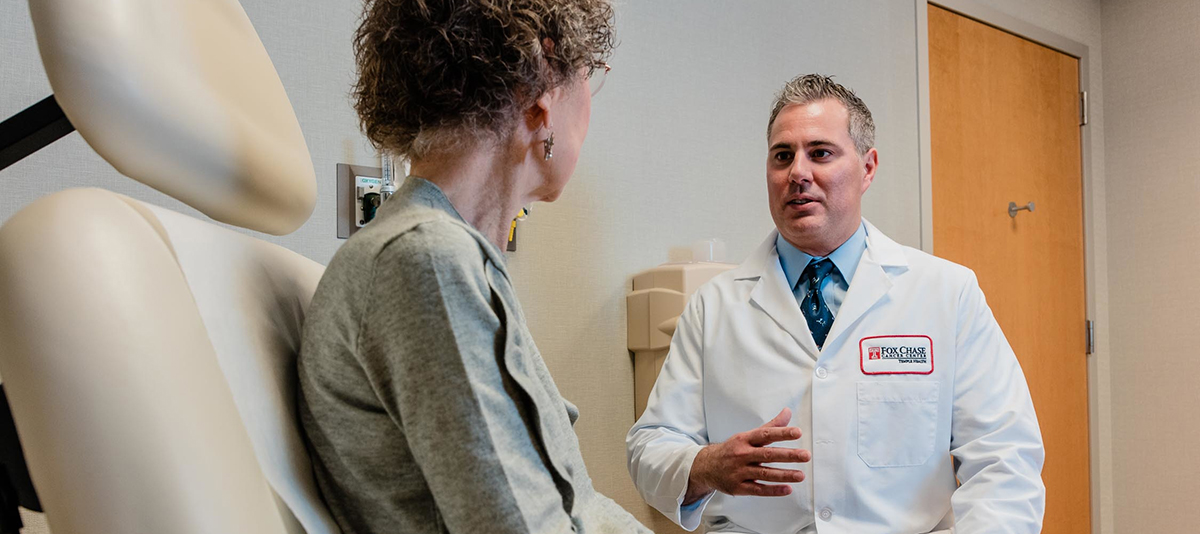
Screening Guidelines for 5 Common Cancers
-
Updated: April 7, 2021
It goes without saying that cancer is not a topic that we want at the top of our mind. But the reality is, knowing your risk factors and getting screened may help catch cancer early.
Talking to your physician at your annual check-up about risk factors and whether screening is appropriate for you is one way to stay on top of cancer. Don’t feel uncomfortable about bringing up concerns that you may have or questions about which screenings you should get. While an appointment for a cancer screening might seem daunting, screenings are usually quick and pain-free and can be life-saving.
Below we discuss a few cancer types for which screening may be a consideration.
If you’d like to make an appointment at Fox Chase Cancer Center for a screening, you can request one online or call 888-517-9184.
Breast cancer
Research has shown that women who get routine screening mammograms are more likely to have their breast cancer found early and to be cured.
It is recommended that all women over the age of 25 undergo formal risk assessment for breast cancer.
For those found to be at average risk for breast cancer:
- Women 40 and older: An annual mammogram is recommended for as long as they’re in good health and are expected to live at least 10 or more years
If you’re at high risk for breast cancer the American Cancer Society (ACS) recommends getting a mammogram and an MRI every year beginning at age 30. Factors that would put a woman at high risk include a family history of breast cancer, a genetic mutation associated with breast cancer, or a history of radiation to the chest.
To learn more: Read "Don’t Put it Off: Get Screened for Breast Cancer"
Cervical cancer
Regular screenings can detect cervical cancer in its earliest stages. Almost all cervical cancers are caused by the human papillomavirus (HPV), and most are asymptomatic in their early stages. Screening for HPV can find an infection that could ultimately lead to cervical cancer.
Current ACS guidelines recommend that:
- Women 25-65 get an HPV test every three years.
If HPV testing alone is not available, get screened with both an HPV/Pap co-test every 5 years or a Pap test every three years.
Some women may need more frequent screenings, specifically those with weakened immune systems—for example, as a result of the human immunodeficiency virus (HIV), an organ transplant, or long-term steroid use.
Colorectal cancer
There are several types of tests to screen for colorectal cancer. Some, like stool tests, mainly find cancer after it has developed. Others, such as a colonoscopy, can find both polyps (abnormal growths) and cancer. If polyps are found during screening they can be removed, reducing the risk of developing cancer in the future.
The ACS recommends screenings that look for both polyps and cancer, but the most important thing is to get tested. According to current ACS recommendations:
If you’re a man or woman at average risk for colorectal cancer, you should begin screening at age 45. Your doctor can help you decide which screening test is best for you and how often you need it.
If you’re at high risk—for instance, if you have a family history of colorectal cancer or a personal history of inflammatory bowel disease—you may need to start screening before age 45 or be screened more often. Talk to your doctor about your risks.
If you have a family history of colorectal cancer, genetic testing can determine your cancer risk, such as the testing done in The Risk Assessment Program at Fox Chase.
Lung cancer
Many people don’t know they have lung cancer until symptoms appear, and at that point the disease may be advanced. In recent years, screening tools such as a low-dose CT scan have been developed that can help catch lung cancer in its early stages when treatment can provide the best outcome.
To see if you meet the following criteria for a low-dose CT scan, talk to your doctor:
- You’re between the ages of 50 and 80.
- You have a history of heavy smoking – for example, you have smoked the equivalent of a pack a day for 20 years.
- You still smoke or have quit within the last 15 years.
To learn more: Read “Lung Cancer Screening: Early Detection for Those With the Highest Risk”
If you meet the criteria, you can also schedule an appointment for a low dose CT scan online or call 888-517-9184.
Skin cancer
Our skin is the largest organ in our body and also one of the most important defenses we have. Taking care of it and knowing our own skin is important. Checking your skin for changes in moles or other marks can help find a skin cancer early, particularly for people at high risk of the disease. The ACS recommends:
- Getting a skin exam from your doctor during a check-up.
- Examining your skin on your own once a month. Check your entire body, using a hand mirror for hard-to-see areas like your back and behind your ears. Do not hesitate for even a moment to call your doctor if you notice anything different about your moles and blemishes.
To learn more: Read about the risks for skin cancer.
At Fox Chase, we have a long history of screening people for cancer—and for successfully treating the disease when it’s found. Both are part of our ongoing commitment to conquering cancer.
